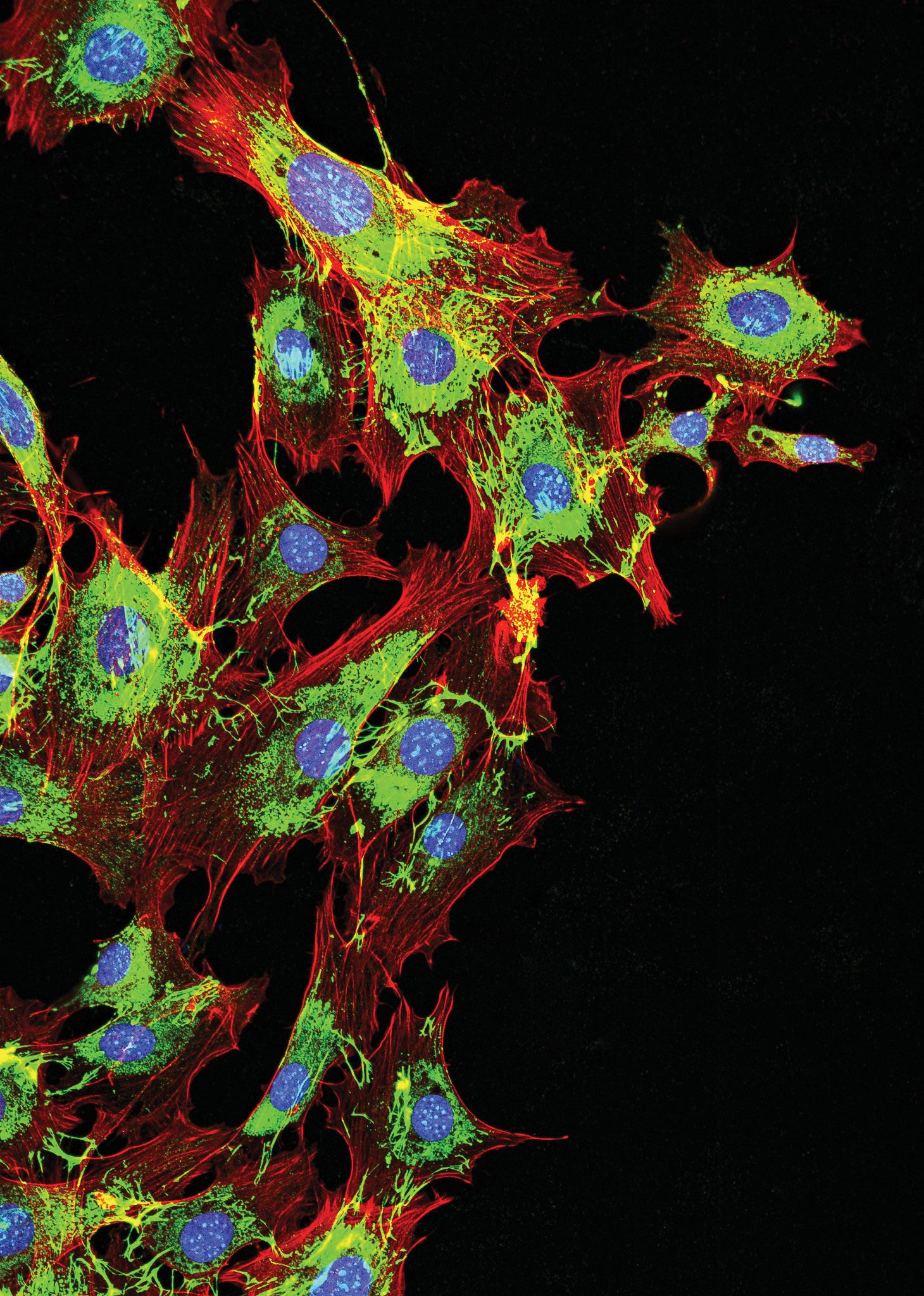
6 minute read
The evolving metastatic breast cancer landscape
Content intended for South African doctors and nurses
The evolving metastatic breast cancer landscape
Advertisement
Dr Devan Moodley, medical oncologist and researcher, based at the Wits Donald Gordon Medical Centre in Johannesburg, presented a CPD accredited webinar on advances in breast cancer (BCa) management. The webinar was sponsored by Eli Lilly and hosted by Specialist Forum.

BCa is the most frequently diagnosed cancer in women (29% of all cancer cases). It is the leading cause of cancer death in women worldwide (6.9% of cancer deaths).1
It is estimated that 45% of new cases diagnosed each year, and more than 55% of BCa related deaths, occur in low- and middle income countries. Overall, 30% of patients diagnosed with early BCa will develop recurrent and/or metastatic disease.2,3
Metastatic BCa is incurable and therapeutic goals are most often palliative. Managing symptoms to maintain optimum quality of life (QoL) is a major goal of treatment.4,5
About 70% of the metastatic BCa patient population have hormone receptor positive (HR+) disease. Endocrine therapy (ET) is generally the preferred option for HR+ BCa irrespective of human epidermal growth factor receptor 2 negative (HER2−) status, unless there is evidence of visceral crisis, or concern/proof of endocrine resistance.6,7
Up to 50% of patients with metastatic ER+ BCa exhibit de novo resistance to first-line ET. The rest will eventually relapse due to acquired resistance.12 In the metastatic setting, ET resistance is defined as progression of disease within the first six months of first-line ET for metastatic BCa, while on ET.7,8
New guidelines recommend a CDK4/6 inhibitor combined with ET as the standard of care for all patients with ER+/HER2- metastatic BCa. CDK4/6 inhibitors have been shown to improve progression free survival (PFS), and either maintains or improves QoL. Overall survival (OS) results are still awaited.7
Abemaciclib is 14 times more potent against CDK4/cyclin D1 than CDK6/cyclin D3 in enzymatic assays. Numerous studies have investigated the safety and efficacy of abemaciclib in the metastatic setting.6,8,9
A Study of Abemaciclib (LY2835219) In Participants With Previously Treated Breast Cancer That Has Spread (MONARCH 1) evaluated the single-agent activity of abemaciclib in women with refractory HR+/ HER2- metastatic BCa. At the 12 month final analysis, the primary objective of confirmed overall response rate (ORR) was 19.7%, the clinical benefit rate was 42.4%, median PFS was six months, and median OS was 17.7 months.8
The Abemaciclib in Combination With Fulvestrant in Women With HR+/ HER2- Advanced Breast Cancer Who Had Progressed While Receiving Endocrine Therapy (MONARCH 2) found that abemaciclib plus fulvestrant significantly extended PFS, versus fulvestrant alone (16.4 versus 9.3 months). In patients with measurable disease, abemaciclib plus fulvestrant achieved an ORR of 48.1% compared with 21.3% in the control arm.6
Abemaciclib as Initial Therapy for Advanced Breast Cancer (MONARCH 3) was a phase III study comparing the efficacy and safety of abemaciclib or placebo plus a nonsteroidal aromatase inhibitors (AI) in 493 postmenopausal women with HR+/ HER2- advanced BCa who had no prior systemic therapy in the advanced setting. In patients with measurable disease, the ORR was 59% in the abemaciclib and 44% in the placebo arm.10
A Randomized Study of Abemaciclib as Initial Therapy for Advanced Breast Cancer (MONARCH 3) analysed final PFS data and updated the secondary endpoints of the 2017 MONARCH 3 study. The ABEMACICLIB arm had a significantly longer median PFS than the placebo arm (28.18 versus 14.76 months). The ORR was 61.0% in the abemaciclib arm versus 45.5% in the placebo arm. The median duration of response was longer in the abemaciclib arm (27.39 months) compared to the placebo arm (17.46 months). The safety profile was consistent with previous reports. The most frequent AEs in the abemaciclib versus placebo arms were neutropenia, diarrhoea and leukopenia.11
Indications in South Africa
In South Africa, abemaciclib is indicated for the treatment of HR+/HER2− advanced or metastatic BCa:
• In combination with an AI as initial ET-based treatment in postmenopausal women
• In combination with fulvestrant in women with disease progression following ET. In pre- or perimenopausal women, ET should be combined with a LHRH agonist
• As monotherapy for the treatment of postmenopausal women with disease progression following endocrine therapy and prior chemotherapy in the metastatic setting.
S4 Yulareb 50 mg. Reg. No.: 53/26/0438.434. Each film-coated tablet contains 50 mg abemaciclib.
S4 Yulareb 100 mg. Reg. No.: 53/26/0439.435. Each film-coated tablet contains 100 mg abemaciclib.
S4 Yulareb 150 mg. Reg. No.: 53/26/0440.436. Each film-coated tablet contains 150 mg abemaciclib.
S4 Yulareb 200 mg. Reg. No.: 53/26/0441.437. Each film-coated tablet contains 200 mg abemaciclib.
References
1. Siegel RL, Miller KD, and Jemal A. Cancer statistics, 2020. CA, 2020.
2. O’Shaugnessy J. Extending survival with chemotherapy in metastatic breast cancer. Oncologist 2005;10(Suppl 3):20-9.
3. Tfayli A, et al. Breast Cancer in Low- and Middle- Income Countries: An Emerging and Challenging Epidemic. J Oncol, 2010:490631.
4. Roché H and Vahdat LT. Treatment of metastatic breast cancer: second line and beyond. Ann Oncol 2011;22:1000-10.
5. Irvin W, et al. Symptom Management in Metastatic Breast Cancer. Oncologist 2011;16:1203-14.
6. Sledge GW, Toi M, Neven P, et al. MONARCH 2: Abemaciclib in Combination With Fulvestrant in Women With HR+/HER2- Advanced Breast Cancer Who Had Progressed While Receiving Endocrine Therapy. J Clin Oncol, 2017.
7. Cardoso F, Costa A, Senkus E, et al. 3rd ESO- ESMO International Consensus Guidelines for Advanced Breast Cancer (ABC 3). Ann Oncol, 2017.
8. Dickler MN, Tolaney SM, Rugo HS, et al. MONARCH 1, A Phase II Study of Abemaciclib, a CDK4 and CDK6 Inhibitor, as a Single Agent, in Patients with Refractory HR +/HER2 – Metastatic Breast Cancer. Clin Cancer Res, 2017.
9. Lallena MJ, Boehnke K, Torres R, et al. Abstract 3101: In-vitro characterization of Abemaciclib pharmacology in ER+ breast cancer cell lines. Cancer Res, 2015;75(15 suppl):3101.
10. Goetz MP, Toi M, Campone M, et al. MONARCH 3: Abemaciclib as initial therapy for advanced breast cancer. J Clin Oncol, 2017.
11. Johnston S, Martin M, Di Leo A, et al. MONARCH 3 final PFS: a randomized study of Abemaciclib as initial therapy for advanced breast cancer. NPJ Breast Cancer, 2019.
12. Global Cancer Statistics 2020: Sung H, Ferlay J, Siegel RL. GLOBOCAN Estimates of Incidence and Mortality Worldwide for 36 Cancers in 185 Countries. CA, 2021.

Eli Lilly (S.A) (Pty) Ltd. Reg. No.: 1957/000371/07. 1st Floor, Golden Oaks House, Ballyoaks Office Park, 35 Ballyclare Drive, Bryanston, 2191. Tel.: +27 11 510 9300.
For full prescribing information, refer to the Professional Information approved by the medicines regulatory authority (12/2020).
© 2021 Eli Lilly and Company. All Rights Reserved.










